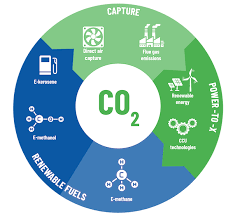
Carbon Capture and Utilization (CCU) involves the capture of the greenhouse gas CO2 from point sources or ambient air and its subsequent conversion into valuable products like chemicals and fuels. It can play a significant role in reducing the consequences of global warming and support adaptation to the climate change impact. Additionally, it has the advantage of producing goods that are very economically viable. In the ‘CoCaCO2la Project’, the goal is the commercial production of Ethylene from captured carbon dioxide. Due to its widespread application in the manufacture of plastics, textiles, tires, pipes, and many medical services, Ethylene is a very significant chemical. Additionally, Ethylene is a renewable fuel, reducing the need for fossil fuels. By capturing and utilizing CO2, CCU innovations are intended to have positive impacts on the economy, society, and environment. Capital costs can be reduced remarkably with CCU technologies. In the ‘CoCaCO2la Project’, the conversion to Ethylene from captured CO2 will be accomplished by the electrochemical reduction of CO2 captured from flue gas emanating from different industries such as quicklime plants, gas-fired power plants, etc. The deployment of full-scale ethylene production from CO2 is estimated to reduce carbon emissions by at least 20-30%. By using CO2 as the feedstock instead of the conventional method of producing ethylene, which involves cracking naphtha at 700 °C temperature and releasing about 4.95 tons of carbon dioxide every ton of ethylene produced, the advantage of reducing carbon emissions will be doubled.
Disclaimer:
 The project is funded by the EU’s Accelerating CCS Technologies (ACT) programme. The UK element of ACT is funded by the Department for Business, Energy & Industrial Strategy (BEIS) under the UK ACT ERA-NET EC GA 691712.
The project is funded by the EU’s Accelerating CCS Technologies (ACT) programme. The UK element of ACT is funded by the Department for Business, Energy & Industrial Strategy (BEIS) under the UK ACT ERA-NET EC GA 691712.